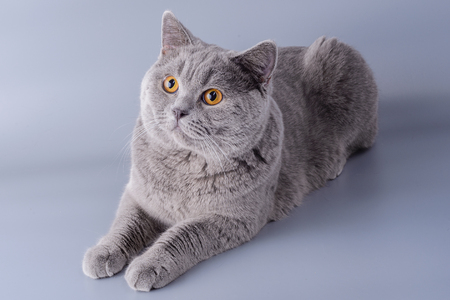Introduction to Exotic Shorthair Cats
Exotic Shorthair cats, often affectionately dubbed as the “teddy bears” of the feline world, have become a treasured presence in many British homes. Developed originally as a shorthaired counterpart to the iconic Persian breed, these plush companions are renowned for their gentle demeanour and irresistibly soft coats. Their rise in popularity across the United Kingdom can be attributed not only to their charming looks but also to their adaptability and affectionate nature. As more Britons seek pets that fit seamlessly into modern lifestyles, Exotic Shorthairs stand out for their low-maintenance grooming needs and endearing personalities. It’s no surprise that they have quickly earned a special place in the hearts of cat lovers throughout the country.
Distinctive Features and Personality
The Exotic Shorthair cat is truly a standout in the world of felines, offering a unique combination of plush looks and an affable nature that fits seamlessly into the British way of life. Renowned for their teddy bear-like appearance, these cats boast thick, dense coats and adorably round faces, reminiscent of the much-loved British Shorthair but with a softer, more luxurious twist. Their expressive, large eyes give them an endearing, almost whimsical charm that has won the hearts of cat lovers across the UK.
Overview of Appearance
| Feature | Description |
|---|---|
| Coat | Short, plush, and dense – easy to groom and remarkably soft to touch |
| Face Shape | Round with a flat nose and prominent cheeks, creating a gentle expression |
| Eye Colour | Typically copper or gold; blue or odd-eyed in some colour variations |
| Body Type | Cobby build – sturdy, medium-sized, and well-balanced |
Gentle Temperament
Exotic Shorthairs are celebrated for their calm and loving disposition. Unlike more demanding breeds, they are content to lounge quietly but will happily join in with family activities. They’re affectionate without being clingy, making them excellent companions for individuals who appreciate company without constant attention-seeking behaviour. Their playful yet gentle nature means they are suitable for households with children or other pets.
The Perfect Fit for British Lifestyles
The tranquil temperament and moderate activity level of Exotic Shorthairs make them particularly well-suited to British living spaces, whether in a cosy city flat or a countryside cottage. Their low-maintenance grooming needs align well with busy schedules, while their sociable yet undemanding personality fits perfectly into the often reserved but warm-hearted British home environment. For those seeking a companion who brings comfort and a touch of luxury without excessive fuss, the Exotic Shorthair stands out as an ideal feline friend.
![]()
3. Health and Preventative Care
Exotic Shorthair cats, with their distinctive features and affectionate temperament, are a cherished addition to many British homes. However, like all pedigree breeds, they come with unique health considerations that require thoughtful attention and proactive care.
Common Health Concerns in Exotic Shorthairs
The most notable health issue for Exotic Shorthairs is their brachycephalic (flat-faced) structure. This can lead to breathing difficulties, especially in warm weather or during physical exertion. Other common concerns include dental problems, tear duct overflow resulting in staining around the eyes, and a predisposition to polycystic kidney disease (PKD), which is found in some bloodlines. As with many purebred cats, heart issues such as hypertrophic cardiomyopathy (HCM) may also occur.
Tailored Healthcare Tips for UK Owners
In the UK’s variable climate, it is particularly important to keep your Exotic Shorthair cool during summer months and ensure they have a comfortable environment year-round. Regular grooming is essential; although their coat is short, it is dense and plush, so weekly brushing helps reduce shedding and prevent matting. Eye care should not be overlooked—use a soft, damp cloth to gently wipe away any discharge. Routine dental checks at the vet and providing appropriate chew toys can help maintain oral health.
The Importance of Preventative Measures
Preventative healthcare plays a crucial role in ensuring your Exotic Shorthair enjoys a long and healthy life. Annual veterinary check-ups are essential for early detection of hereditary conditions like PKD or HCM. Consider asking your breeder about genetic testing to reduce the risk of inherited diseases. Vaccinations, regular flea and worm treatments, and maintaining a healthy diet tailored to indoor cats will also contribute greatly to your cat’s wellbeing. By adopting these preventative measures, British owners can help their beloved Exotic Shorthairs thrive as plush companions for years to come.
4. Nutrition and Day-to-Day Wellbeing
Ensuring your Exotic Shorthair thrives in a British household starts with a well-rounded approach to nutrition and everyday care. These plush felines are known for their laid-back personalities, but maintaining their health requires mindful choices regarding diet, treats, and daily routines.
Balanced Diet: What Suits the British Exotic Shorthair?
It’s important to feed your Exotic Shorthair a balanced diet tailored to their unique needs. While these cats aren’t typically fussy eaters, their tendency towards a sedentary lifestyle means that calorie control is essential to prevent weight gain. Opt for high-quality, complete cat foods readily available from trusted UK pet retailers. Choose recipes rich in protein and low in unnecessary fillers or artificial additives. Wet food can be included for hydration, which is especially beneficial in the drier indoor climates common in many British homes during winter months.
| Food Type | Benefits | Recommended Frequency |
|---|---|---|
| High-Protein Dry Food | Supports muscle tone and dental health | Daily (as main meal) |
| Wet Food | Aids hydration; palatable for picky eaters | A few times per week or mixed with dry food |
| Fresh Water | Essential for urinary tract health | Always available; refreshed daily |
Treats: British Favourites and Healthy Choices
Treats are part of the fun of sharing your life with an Exotic Shorthair, but moderation is key. In the UK, it’s easy to find treats formulated for cats’ wellbeing—think freeze-dried chicken bites or dental chews. Avoid giving them human snacks like cheese or cooked meats seasoned with salt or spices, as these can upset their delicate digestion. For enrichment, use treats sparingly as rewards during play or grooming sessions.
Daily Routines for Wellbeing
A structured daily routine helps keep your Exotic Shorthair both mentally and physically healthy. Set aside time for interactive play using toys that stimulate their natural hunting instincts—feather wands and puzzle feeders work well. Grooming should be a regular ritual due to their dense coat, even though they shed less than longer-haired breeds. Brushing every other day will help reduce hairballs and keep their fur plush. Lastly, don’t forget regular check-ups with your local vet and annual boosters as advised by the British Veterinary Association.
Quick Tips for a Happy Exotic Shorthair at Home:
- Feed a measured amount of premium cat food twice daily.
- Incorporate 10–15 minutes of active play each day.
- Maintain fresh water stations throughout your home.
- Brush regularly to avoid matting and excess shedding.
- Schedule annual veterinary checks and vaccinations.
By following these practical guidelines, you’ll ensure your Exotic Shorthair remains healthy, contented, and very much at home in the heart of Britain.
5. Grooming for the British Climate
The UK’s famously unpredictable weather – from damp drizzles to chilly winds – can have a real impact on how you care for your Exotic Shorthair cat’s plush coat. While these felines are blessed with dense, velvety fur that offers a degree of protection against the cold, it also means they require regular grooming to stay healthy and comfortable in the British climate.
Essential Grooming Practices
Brushing your Exotic Shorthair at least twice a week is key to preventing matting and reducing hairballs. Their thick undercoat can trap dirt and moisture, especially after outdoor adventures or even just lounging by an open window on a rainy day. A soft-bristled brush or a comb specifically designed for short-haired breeds works wonders, helping to remove loose hairs and distribute natural oils throughout the coat.
Dealing with Dampness
The UK’s frequent rain and humidity can lead to damp fur, which not only feels uncomfortable for your cat but can also foster skin irritations if left unchecked. After wet weather walks or window-gazing sessions, gently towel dry your Exotic Shorthair’s coat and ensure their bedding stays clean and dry. This extra step helps prevent fungal infections and keeps their skin in top condition.
Shedding and Seasonal Changes
Like most cats, Exotic Shorthairs shed more during seasonal transitions – particularly in spring and autumn when Britain’s temperatures swing. Increased brushing during these times will help manage excess hair around your home and support your feline friend’s skin health as their coat adapts.
Avoiding Over-Bathing
While it might be tempting to give your pet a bath during muddy months, over-bathing can strip essential oils from their coat. Unless advised by your vet, stick to occasional baths using gentle, cat-safe shampoo.
A Final Word on Grooming
By staying attentive to grooming routines tailored to the UK’s unique climate, you’ll keep your Exotic Shorthair looking plush and feeling content all year round. Regular checks for knots, damp patches, or signs of irritation go a long way in ensuring your British feline companion remains the picture of comfort and health.
Integration into British Community and Home Life
Exotic Shorthair cats have effortlessly found their place within the traditional British household, melding seamlessly with the UK’s distinctive way of life. Their calm temperament and affectionate nature make them particularly well-suited to British homes, whether you live in a bustling city flat or a cosy cottage in the countryside. These plush companions are known for being adaptable, content to spend quiet evenings by the fire or playfully engaging with family members during busier moments.
Socialisation and Family Dynamics
One of the standout traits that endear Exotic Shorthairs to British cat lovers is their sociable yet undemanding disposition. Unlike some more independent breeds, Exotic Shorthairs thrive on gentle interaction and form strong bonds with children, adults, and even other pets. This makes them an excellent choice for multi-pet households—a common feature in many UK homes. British owners appreciate how these felines contribute to the warm, inclusive atmosphere so cherished in local communities.
Recommendations from UK Cat Enthusiasts
Seasoned British cat enthusiasts often recommend Exotic Shorthairs as ideal companions for first-time owners due to their manageable grooming needs and easy-going personalities. Many suggest incorporating interactive toys and regular play sessions to keep these cats mentally stimulated, particularly during the darker winter months when outdoor adventures may be limited. It’s also advised to maintain routine health checks with a trusted local vet, supporting both preventive care and longevity—an approach deeply valued in UK pet culture.
Conclusion: A Perfect Fit for British Lifestyles
Ultimately, Exotic Shorthair cats offer an irresistible blend of charm, adaptability, and companionship that aligns beautifully with British values of comfort, community, and wellbeing. Whether nestled on a windowsill watching the rain or engaging with family during teatime, these plush feline friends truly become part of the fabric of home life across the UK.


